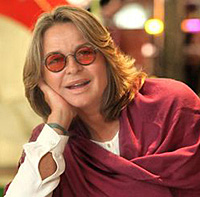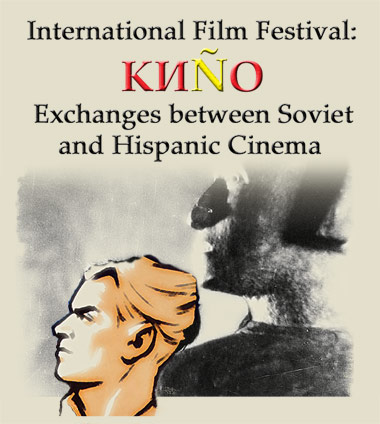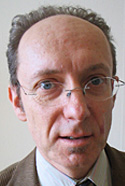Presentations by noted South American filmmakers Solveig Hoogesteijn of Venezuela and Raphael Alvarez of Brazil highlight Lawrence University’s second Latin American and Spanish Film Festival April 10-14.

With a theme of music, the festival features nine international films, each shown in Spanish with English subtitles. All nine films, screened in the Warch Campus Center cinema, are free and open to the public.
Hoogesteijn, born in Sweden but raised in Venezuela, will introduce “Maroa,” a film she wrote, produced and directed, Thursday, April 11 at 6:30 p.m. She also will discuss the state of Latin American cinema.
Alvarez, winner of eight awards for his film “Dzi Croquettes,” discusses the film and his career Friday, April 12 at 6:30 p.m. following its screening.
Both director presentations will take place in the Warch Campus Center cinema.
A reception to open the festival will be held Wednesday, April 10 at 7 p.m. and a closing reception will celebrate the festival Sunday, April 14 at 6:30 p.m. Both events will be held in the Mead Witter Room of the Warch Campus Center.
The festival line-up:
 • Wednesday, April 10, “Blancanieves” (Spain, 2012)
• Wednesday, April 10, “Blancanieves” (Spain, 2012)
The black-and-white silent Spanish drama film directed by Pablo Berger is based on the Brothers Grimm fairy tale “Snow White.” Set in a romantic vision of 1920s Andalusia, the film is intended to be a homage to 1920s European silent films. Winner of 10 Goya Awards, including Best Film, it was Spain’s 85th Academy Awards official submission to the Best Foreign Language category. 5 p.m.
• Thursday, April 11, “Maroa” (Venezuela-Spain, 2006)
Eleven-year-old petty criminal Maroa lives with her violent grandmother in Caracas. After her boyfriend is involved in a shooting, Maroa is arrested and sent to a school where Joaquin, a shy and unconventional teacher, conducts the youth orchestra. He asks Maroa to join and is immediately interested in this naturally talented, but totally undisciplined young girl. Joaquin, the only person to offer hope in the midst of her rejection, finds that through Maroa, his world has also changed forever. 4:30 p.m.
 • Thursday, April 11 “Dudamel: Let the Children Play” (Venezuela-USA, 2010)
• Thursday, April 11 “Dudamel: Let the Children Play” (Venezuela-USA, 2010)
Children’s and youth orchestras are emerging in many countries of the world, inspired by the Venezuelan musical and educational program “El Sistema,” which immerses children in the world of music, art, team work, discipline, cooperation, fun, learning, creativity and high values. Celebrated Venezuelan conductor Gustavo Dudamel, a product of “El Sistema,” leads a journey through the stories of some of the young people who are experiencing the joy of music in the most diverse and contrasting corners of the world. Filmed in seven different countries, the children bring a simple message: art is a universal right. The film provides a glimpse into the world of orchestras, conducting, and the importance of art as a hopeful path to face the educational crisis worldwide. 8:30 p.m.
• Friday, April 12 “Dzi Croquettes” (Brazil, 2009)
 A decade ago, a well received documentary called “The Cockettes” chronicled the impact of a San Francisco-based troupe of drag performers during the 1960s and ’70s. “Dzi Croquettes” pays tribute to a similar group of performers in Brazil who may have modeled themselves on the Cockettes. But the Croquettes were making a more highly charged political statement because they emerged during a time of extreme repression in Brazil. Following a military take over of the government in 1964, new laws placed severe limits on artistic freedom. The Croquettes defied governmental restrictions as well as the mores of the time. The film includes interview material with Liza Minnelli. 4:30 p.m.
A decade ago, a well received documentary called “The Cockettes” chronicled the impact of a San Francisco-based troupe of drag performers during the 1960s and ’70s. “Dzi Croquettes” pays tribute to a similar group of performers in Brazil who may have modeled themselves on the Cockettes. But the Croquettes were making a more highly charged political statement because they emerged during a time of extreme repression in Brazil. Following a military take over of the government in 1964, new laws placed severe limits on artistic freedom. The Croquettes defied governmental restrictions as well as the mores of the time. The film includes interview material with Liza Minnelli. 4:30 p.m.
• Saturday, April 13 “Birds of Passage” (USA-Uruguay, 2012)
Two young Uruguayan songwriters, Ernesto and Yisela, move to the capital, leaving behind their respective hometowns on the borders of Brazil and Argentina. After years of composing songs reflective of their origins, both decide to explore new horizons and fulfill the dream of recording an album. Yisela struggles to reconcile the emerging possibilities of a career in Uruguay with her plans to move to Argentina while Ernesto confronts personal conflicts that threaten to sabotage his creative passion. Fusing documentary film and music, the film interweaves the songs and stories of the two composers. With striking vérité cinematography and an unforgettable soundtrack, the film explores the challenges of being a young artist and the art of searching, inside and outside oneself. 4:30 p.m.
 • Saturday, April 13, “Marimbas from Hell” (Guatemala-France-Mexico, 2010) Don Alfonso is a deliveryman. He also plays marimbas, a traditional Guatemalan instrument, in a folkloric musical show in one of Guatemala City’s upscale hotels, but faces a growing lack of interest for his instrument, considered by many out of date and old fashioned. Black is pioneer of the Heavy Metal Guatemalan underground stage. He also is a doctor in the public hospital, but his long hair and tattoos leave patients wary of being treated by him. Don Alfonso and Black meet and soon decide to combine their talents to create a new project — Marimbas from Hell. They could never have imagined the reactions their project would produce. 8:30 p.m.
• Saturday, April 13, “Marimbas from Hell” (Guatemala-France-Mexico, 2010) Don Alfonso is a deliveryman. He also plays marimbas, a traditional Guatemalan instrument, in a folkloric musical show in one of Guatemala City’s upscale hotels, but faces a growing lack of interest for his instrument, considered by many out of date and old fashioned. Black is pioneer of the Heavy Metal Guatemalan underground stage. He also is a doctor in the public hospital, but his long hair and tattoos leave patients wary of being treated by him. Don Alfonso and Black meet and soon decide to combine their talents to create a new project — Marimbas from Hell. They could never have imagined the reactions their project would produce. 8:30 p.m.
• Sunday, April 14, “The Wind Journeys“ (Colombia, 2009)
For most of his life, Ignacio Carrillo traveled the villages of northern Colombia, playing traditional songs on his accordion, a legendary instrument said to have once belonged to the devil. He eventually marries and settles in a small town, leaving his nomadic life behind. But after the traumatic death of his wife, he vows to never play the accursed accordion again, embarking on a final journey to return the instrument to its rightful owner. On the way, he is followed by a spirited teenager who is determined to become his apprentice. Tired of loneliness, Ignacio accepts the young man as his pupil. Together they cross the vast Colombian terrain, discovering the musical diversity of Caribbean culture along the way. 4:30 p.m.
 • Sunday, April 14, “Violeta Went to Heaven” (Chile, 2011)
• Sunday, April 14, “Violeta Went to Heaven” (Chile, 2011)
Like a Chilean Boby Dylan or Edith Piaf, Violeta Parra was a folksinger and pop culture icon whose songs expressed the soul of her nation and protested social injustice. The film tells the extraordinary story of Parra’s evolution from impoverished child to international sensation to Chile’s national hero, while capturing the swirling intensity of her inner contradictions, fallibilities and passions. More than mere linear biography, the film draws on an impressionistic structure and a reverberating performance by actress Francisca Gavilán to unearth Parra’s elusive, charged core. Parra’s heart-wrenching, indelible songs permeate the film and will penetrate the viewer’s soul. 8:30 p.m.
About Lawrence University
Founded in 1847, Lawrence University uniquely integrates a college of liberal arts and sciences with a nationally recognized conservatory of music, both devoted exclusively to undergraduate education. It was selected for inclusion in the Fiske Guide to Colleges 2013 and the book “Colleges That Change Lives: 40 Schools That Will Change the Way You Think About College.” Individualized learning, the development of multiple interests and community engagement are central to the Lawrence experience. Lawrence draws its 1,500 students from nearly every state and more than 50 countries. Follow Lawrence on Facebook.

